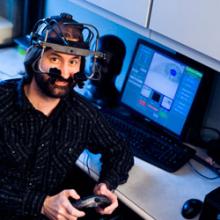The field of cognitive science is just as complex as the human mind, which makes sense considering that cognitive science is most succinctly defined as the study of human thought and behavior.
At UC Merced, some of the brightest minds in the field converge to offer an interdisciplinary course of study that integrates methods and approaches from neuroscience, linguistics, psychology, philosophy, and computer science. Here’s a small sampling of current research efforts:
- The program’s lead architect, McClatchy Chair Teenie Matlock, examines a wide range of communication issues, including the effects of political messaging on public perception of candidates and the impact of leading questions on eye-witness testimony in courtroom dialogue.
- Graduate student Alexandra Paxton studies interpersonal synchrony — the phenomenon of how people in a conversation subconsciously synchronize their movements, such as nodding or gesturing – during conflict.
- Using innovative eye-tracking and motion-tracking equipment, Professor Michael Spivey studies how humans perceive and respond to what they hear and see. The equipment records people's actual responses and reveals what options they considered in making their decision.
- The program’s newest hire, Professor Anne Warlaumont, analyzes the emergence of verbal communication in infants.

Some of UC Merced’s researchers have already caused significant changes in the field. Spivey’s research, for example, has revolutionized how people think the brain works by showing that various brain regions simultaneously communicate with each other. Older models approached the brain as a computer that would move through modular processes, one by one.
Others, like Paxton, are delving into areas of research with a finer degree of detail that may lead to other breakthroughs. Paxton, who works directly with graduate group chair Rick Dale, hopes that by studying language and behavior in conflict, she can improve the treatment of youth in rehabilitation centers.
UC Merced’s Cognitive and Information Sciences (CIS) Ph.D. program sets itself apart from graduate programs at other universities by emphasizing computation, technology and applications. Our researchers view intelligent behaviors as emerging from interactions among brain, body and environment – not just neural processes.



